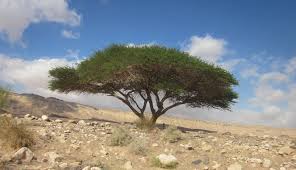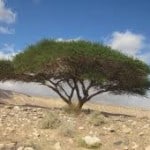The psychological dangers of walking the wilderness can be overwhelming. This is true of our own individual journeys through life or of the corporate journey of our people. One can become frightened of the shortness of our stature and by the shortness of sight. One can lose awareness of the depth of our roots which continue to provide sustenance. At such points of crisis one can turn to arrogance or despondency.
That can easily lead to idolatry. At times it can be the clear and immoral adultery of Peor that the maidens of Midyan seduced may of the men of Israel into. At times it can be the creation of other false idols. Idols such as old irrelevant politicians and entertainers who are paid incredible sums to celebrate an extravagant birthday party ,at a time where budgets are being cut everywhere else. That too is idolatry. It is to those weaknesses that Balaam and Balak attempted to touch.
Balaam the prophet to the nations declares in the Torah portion that “Amalek is the first ( Rosh) of the nations.” (Num. 24:20) Rashi explains that the Hebrew word “rosh” refers to the fact that Amalek was the first nation to attack the Jews as they went out of Egypt. The Zohar asks, “What is the reason that the war that Amalek waged against Israel was singled out for remembering by the Holy One Blessed Be He, more than all the wars that all other nations waged against Israel?” (Zohar, Shemot 194b)
The answer is that the war battled by Amalek was not only a physical one, but rather it was a spiritual struggle. Amalek represents the Rosh or head of the evil nations that will endeavor at all times to eradicate the Jewish people and their connection to G-d.They represent the evil power that attempts to instill doubt and confusion into the world around us about the sovereignty of G-d . That is why we are also told “ Hashem will have war with Amalek from generation to generation.'( Exodus 17;16).
The Zohar (III: 184b) speaks of the unbridled hatred of Balak and Balaam, for the people of Israel .It declares regarding these two that “ No other people experienced and acted out of such hatred save Amalek, who also hated the Jewish people greatly. “. In fact we are told that all this is hinted in their names .The last two letters in the Hebrew name of Balaam joined with the last two letters of Balak spell out the name of Amalek, the eternal enemy.
Yet by the end of the Torah portion we sense Balaam’s frustration as the joint efforts of Balak and Balaam to curse the Jewish people ends in failure and disgrace. It is then that he suggests another form of attack on the people of israel. He suggest to Balak to send the daughters of Median to seduce the children of Israel. We read of the results of this suggestion later “ Israel settled in Shittim, and the people began to commit harlotry with the daughters of Moav . They invited the people to the sacrifices of their gods, and the people ate and prostrated themselves to their gods.”( Numbers 25:1-2)“
Balaam realized that attacking the people of Israel frontally may not succeed. Yet he understood that attacking the sanctity of the Israelites might actually bring about a separation from G-d and make them physically and spiritually more vulnerable.
As a result we then read
“And Moshe said unto them: ‘Have you saved all the women alive? Behold, these caused the children of Israel, through the counsel of Balaam, to revolt so as to break faith with Hashem in the matter of Peor, and so the plague was among the congregation of Hashem. ( Numbers 31:15-16).
The mention of the location of this event is critical” “ Israel settled in Shittim”. The area and the fountain it contained were called Shittim because of the abundance of Shittim (Acacia) trees in the area. The Midrash Rabba declares “the fountain of Shittim was a place of harlotry and it was the one that watered Sodom.” It was that sense of moral lowness that always leads to the idol worship.
Rabbi Kook teaches that idolatry originates out of a holy desire to connect to the Infinite. Yet a mixture of ignorance, immorality and smallness of vision can thwart that desire into simple solutions like idolatry.He writes “The unholy alliance of spiritual yearnings together with immoral and decadent behavior produces the intrinsic foulness of idolatry. “( Shemoneh Kvatzim)
Yet on the other hand we re-encounter the acacia wood when we are told in the book of Exodus the following:
“They shall make an ark of acacia wood ( Atzei Shittim), two and a half cubits its length, a cubit and a half its width, and a cubit and a half its height.. And you shall overlay it with pure gold; from inside and from outside you shall overlay it, and you shall make upon it a golden crown all around.( Exodus 25:10-11)
The people were being commanded to place the most precious item in the world into this vessel they were to create. The very words of G-d carved into stone were to be placed into an ark made of acacia wood lined with gold. Why acacia wood?
Just as importantly , the choice of using Atzei Shittim ( acacia wood) seemed to have been predestined and predetermined. The midrash ( Rashi ibid 25:5) tells us that that one of the first things the Patriarch Yaacov did when he entered Egypt was to plant Shittim trees for use in the Tabernacle over 200 years later. The use of this specific type of wood was clearly not to be a choice of happenstance.
What can the use of this acacia wood in the making of the ark and the acacia wood found in this “place of immorality” teach us.
Acacia Tortilis is a low ( 1-5 meters) desert tree with an small umbrella shaped canopy .The branches grow outward symmetrically in all directions, and create an inverted cone. Its existence in the wilderness is facilitated by the fact that the tree grows very deep roots. It grows in places where there is water at great depths and nourishes on water stores that other plants cannot reach.
This may connect to the Mishna that teaches; “Whoever has three particular traits is counted among the students of Abraham, and whoever has three other traits is among the students of Balaam. He who has a good eye, humility and contentedness is a student of Abraham, while he who has an evil eye, arrogance and greed is a student of Balaam.” (Talmud, Pirkei Avot 5:22)
The Acacia tree ( Shittim) is the appropriate symbol of humility .It is also a great symbol of one with a content and a soul of wide vision ( a vision that accepts and understands one’s portion in the divine plan). The passion of Idolatry gets in the way of such vision and sense of being. Passion ,greed , mixed with insecurity makes one forget one’s roots and one’s purpose and results in a turning towards selfish idolatry and wantonness.
The only remedy in such a situation is to be reminded of those deep roots . It is critical not to be overwhelmed and frightened by the wilderness that surrounds us regardless of how low our stature may seem to be in our eyes or in the eyes of others. . That is the reason Jacob prepared the Shittim trees in advance. That is the reason that specific tree was used to build the ark. That is also the meaning behind the prophet Joel declaration that when the ultimate redemption will blossom and flower those deep roots will be nourished again from waters coming from the Temple mount .
“And a fountain shall come forth of the house of G-d, and shall water the valley of Shittim.” (Joel 4:18): May it be speedily in our days.
( le-refuat Yehudit bat Golda Yocheved)

